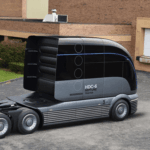Driverless trucks are becoming a reality as startup Aurora Innovation Inc. announced a partnership with German technology company Continental AG to design and develop an autonomous driving system for commercial trucking. Aurora’s driverless truck system is set to launch in late 2024, with production of the joint autonomous system expected in 2027. The partnership is expected to accelerate the broader adoption of the technology in the freight hauling business. The specific details of the partnership have not been disclosed, but the two companies have agreed to a hardware as a service relationship, based on mileage driven.
While autonomous trucks may bring accessibility, safety, and efficiency to the movement of goods, they also pose a significant threat to the livelihood of truck drivers. The advent of driverless trucks may lead to the loss of millions of truck-driving jobs, which would have a devastating impact on truck drivers and their families, particularly in an industry that is already facing a driver shortage.
The trucking industry has been grappling with a shortage of drivers for several years, with the American Trucking Associations estimating a shortage of 60,800 drivers in 2018, a number that is expected to grow in the coming years. The shortage is driven by several factors, including an aging workforce, increasing regulatory burdens, and the lure of higher-paying jobs in other industries.
Despite the potential loss of jobs, there are some potential benefits of driverless trucks. For one, they can operate around the clock on some routes, which can lead to increased productivity and reduced delivery times. Additionally, they have the potential to improve highway safety by reducing accidents caused by human error.
However, the widespread adoption of autonomous trucks is likely still a long way off, and there are several hurdles that need to be overcome before they become a common sight on our highways. One major challenge is developing the necessary infrastructure to support driverless trucks, such as charging stations and maintenance facilities. Additionally, the technology is still in its early stages, and there are many questions that need to be answered before it can be widely adopted.
In conclusion, the partnership between Aurora and Continental is an exciting development in the world of autonomous trucking. While there are potential benefits to driverless trucks, there are also significant challenges that need to be addressed. It remains to be seen how the technology will impact the trucking industry, but it is clear that truck drivers need to be included in the conversation about the future of the industry.







